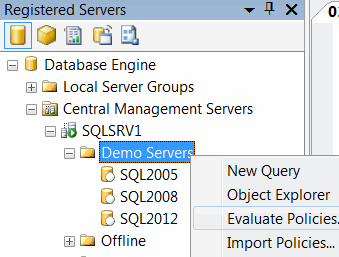By: Svetlana Golovko | Updated: 2013-01-31 | Comments (2) | Related: More > Central Management Servers
Problem
So, you have created a SQL Server Policy to check database recovery models. Now you need to check the databases on all of your SQL Server instances. In this tip we will show how you can evaluate a SQL Server policy against multiple instances.
Solution
To evaluate the policy against multiple SQL Servers you can use Central Management Servers or Registered Servers. In this tip we will evaluate a policy against SQL Server 2005, SQL Server 2008 and SQL Server 2012 using Central Management Servers.
Prerequisites
To learn more about Policy Based Management please review this tip: Using Policy Based Management in SQL Server 2008.
To learn more about Central Management Servers please review this tip: Execute SQL Server query on multiple servers at the same time.
Checking Policies Across Instances
After you have setup Central Management Servers and created the policy follow these steps:
Step 1
In SQL Server Management Studio (SSMS) click the "View" menu and then click "Registered Servers"

Step 2
Right click on the server or server group under Central Management Servers and select "Evaluate Policies..."

Step 3
Select the source where the policy is saved:

Step 4
Select the policy you want to evaluate:

Step 5
Click "Evaluate" and then review the results as shown below:

Next Steps
- You can also use Registered Servers in SSMS to evaluate a policy on multiple servers. Refer to this tip for more information.
- Create other policies that you want to evaluate on multiple servers
- Read more tips on Policy Based Management
- Read more tips on Central Management Servers
About the author
 Svetlana Golovko is a DBA with 13 years of the IT experience (including SQL Server and Oracle) with main focus on performance.
Svetlana Golovko is a DBA with 13 years of the IT experience (including SQL Server and Oracle) with main focus on performance. This author pledges the content of this article is based on professional experience and not AI generated.
View all my tips
Article Last Updated: 2013-01-31






